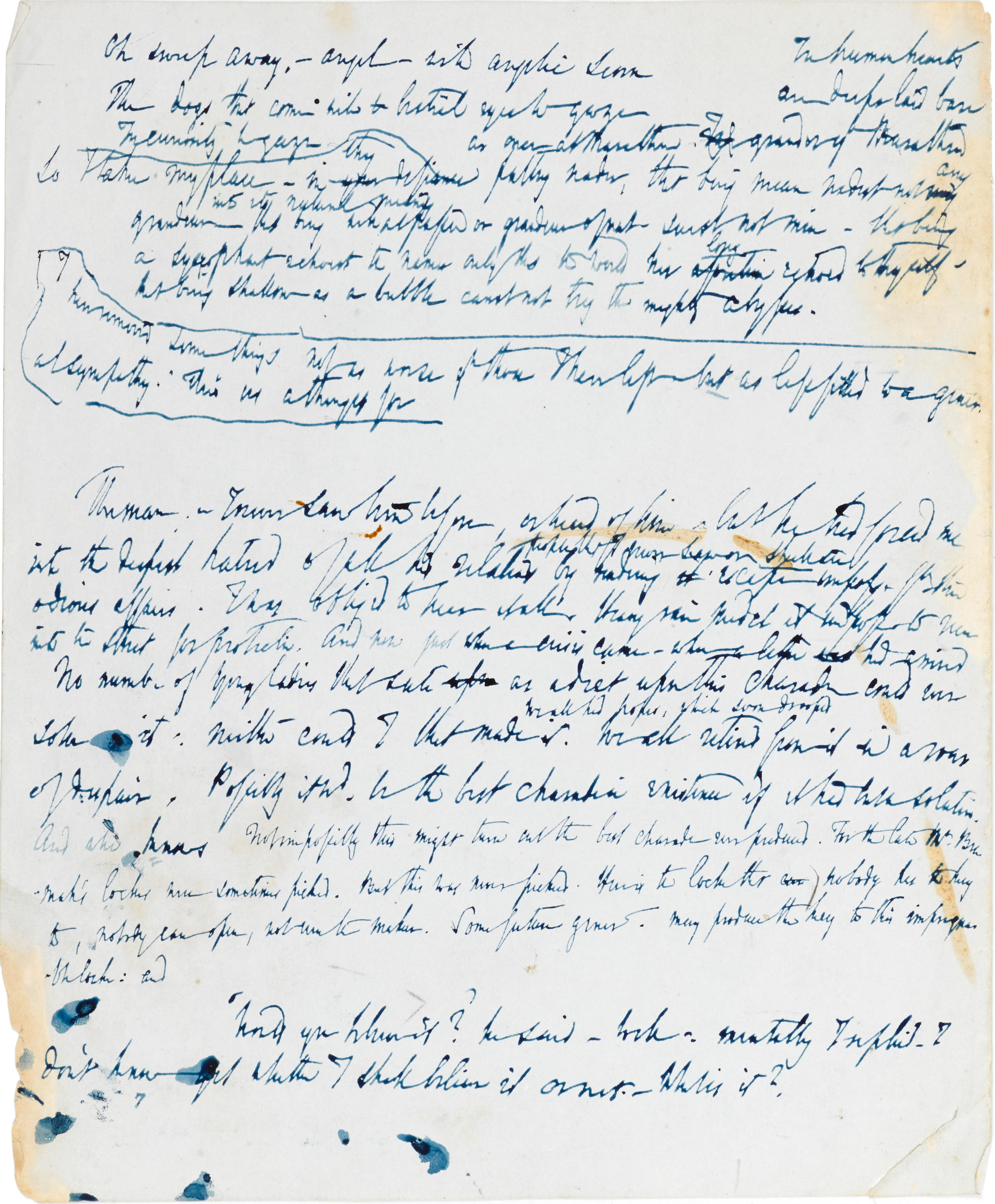DE QUINCEY, Thomas (1785-1859). Autograph letter signed to [Charles] Knight, Rydal, 6 April 1826, 3½ pages, 4to , address panel, traces of seal (2 small tears in second leaf). A long and chatty letter in which De Quincey mentions his opium addiction, the letter being partly prompted by the news of financial disasters in the city, and his hopes that Knight has escaped, 'Even in these remote vales we have stray memorials of the great shipwreck floating about us; my friend Wordsworth's brother-in-law, a banker at Stockton-upon Tees, being the chief. In his declining days he finds himself in one day minus £140,000 (viz. his whole estate). W[ordsworth] himself by the stoppage of Hurst and Robinson cannot be said to have lost but has failed to receive £300'. Dismissing his own small losses, De Quincey enjoins Knight that if ever he is his debtor, he should pay him 'in an ingot or one of Ricardo's gold sticks'. He continues with an account of his experiences during the winter, including his arrest the previous October, and an expansive description of the Sheriff's officer, who 'turned out to be quite a "literary character"'. He eventually escaped by mutual agreement from committal to the assizes when 'he having peaceful attornies, the enemy no less than I became anxious for a truce: and finally we treated on the principle of the status quo ante bellum : that being my sine qua non '. The depression that followed, with influenza and an inflammation of the eyes, left him 'nervous in the last degree, utterly lost in despondency; and next door to an idiot...For not being able to read, think or see, I had no shield against the deadly melancholy to which Opium has too much predisposed me'. The letter concludes with enquiries about Knight's wife, and news of acquaintances, including Professor [John] Wilson from whom he had 'a good deal of lit[erary] gossip' including the secret of Lockhart's forthcoming appointment to the Edinburgh Review , and Wilson's description of his rides in the vales with [George] Canning. Charles Knight (1791-1873) was the publisher of Knight's Quarterly Magazine , to which De Quincey contributed in 1823/24. Knight's scheme for the production of an inexpensive series of books, a 'national library', was curtailed by the financial panic in 1826. Wordsworth's brother-in-law was John Hutchinson the eldest brother of Mary Wordsworth. The Tees Bank in which he was a partner went bankrupt early in 1826. Hurst and Robinson, the London agent of Constable, was also financially ruined, although Wordsworth held out for the repayment of £300 owing to him. George Canning, to whom John Wilson the 'Christopher North' of Blackwood's and professor of philosophy at Edinburgh, acted as 'Cicerone' on his rides, visited Windermere in October 1825.
DE QUINCEY, Thomas (1785-1859). Autograph letter signed to [Charles] Knight, Rydal, 6 April 1826, 3½ pages, 4to , address panel, traces of seal (2 small tears in second leaf). A long and chatty letter in which De Quincey mentions his opium addiction, the letter being partly prompted by the news of financial disasters in the city, and his hopes that Knight has escaped, 'Even in these remote vales we have stray memorials of the great shipwreck floating about us; my friend Wordsworth's brother-in-law, a banker at Stockton-upon Tees, being the chief. In his declining days he finds himself in one day minus £140,000 (viz. his whole estate). W[ordsworth] himself by the stoppage of Hurst and Robinson cannot be said to have lost but has failed to receive £300'. Dismissing his own small losses, De Quincey enjoins Knight that if ever he is his debtor, he should pay him 'in an ingot or one of Ricardo's gold sticks'. He continues with an account of his experiences during the winter, including his arrest the previous October, and an expansive description of the Sheriff's officer, who 'turned out to be quite a "literary character"'. He eventually escaped by mutual agreement from committal to the assizes when 'he having peaceful attornies, the enemy no less than I became anxious for a truce: and finally we treated on the principle of the status quo ante bellum : that being my sine qua non '. The depression that followed, with influenza and an inflammation of the eyes, left him 'nervous in the last degree, utterly lost in despondency; and next door to an idiot...For not being able to read, think or see, I had no shield against the deadly melancholy to which Opium has too much predisposed me'. The letter concludes with enquiries about Knight's wife, and news of acquaintances, including Professor [John] Wilson from whom he had 'a good deal of lit[erary] gossip' including the secret of Lockhart's forthcoming appointment to the Edinburgh Review , and Wilson's description of his rides in the vales with [George] Canning. Charles Knight (1791-1873) was the publisher of Knight's Quarterly Magazine , to which De Quincey contributed in 1823/24. Knight's scheme for the production of an inexpensive series of books, a 'national library', was curtailed by the financial panic in 1826. Wordsworth's brother-in-law was John Hutchinson the eldest brother of Mary Wordsworth. The Tees Bank in which he was a partner went bankrupt early in 1826. Hurst and Robinson, the London agent of Constable, was also financially ruined, although Wordsworth held out for the repayment of £300 owing to him. George Canning, to whom John Wilson the 'Christopher North' of Blackwood's and professor of philosophy at Edinburgh, acted as 'Cicerone' on his rides, visited Windermere in October 1825.














Try LotSearch and its premium features for 7 days - without any costs!
Be notified automatically about new items in upcoming auctions.
Create an alert